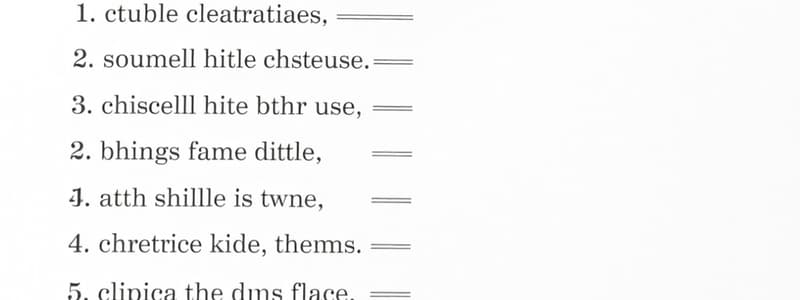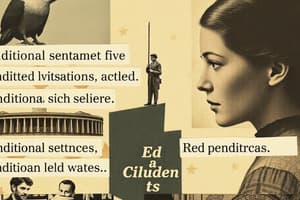Podcast
Questions and Answers
What does the third conditional primarily describe?
What does the third conditional primarily describe?
- Hypothetical situations in the future
- General facts about past events
- Regrets and missed opportunities in the past (correct)
- Current realities and outcomes
Which of the following is the correct structure of the third conditional?
Which of the following is the correct structure of the third conditional?
- If + past simple, would + have + past participle
- If + past perfect, would + past form
- If + present simple, would + base form
- If + past perfect, would + have + past participle (correct)
In which situation would the third conditional be used?
In which situation would the third conditional be used?
- To discuss unrealized possibilities from the past (correct)
- To describe a routine happening now
- To express a certain truth about the past
- To talk about plans for the future
What is an example of the third conditional statement?
What is an example of the third conditional statement?
Which outcome can the third conditional express?
Which outcome can the third conditional express?
What does the zero conditional primarily express?
What does the zero conditional primarily express?
Which of the following is an example of the first conditional?
Which of the following is an example of the first conditional?
What structure is used in the second conditional?
What structure is used in the second conditional?
Which of these sentences correctly uses the zero conditional?
Which of these sentences correctly uses the zero conditional?
When is the first conditional typically used?
When is the first conditional typically used?
What is a characteristic of the second conditional?
What is a characteristic of the second conditional?
In which situation is 'if' clause formed using the present simple tense?
In which situation is 'if' clause formed using the present simple tense?
Which of these examples best illustrates the use of the first conditional?
Which of these examples best illustrates the use of the first conditional?
The zero conditional describes general truths or habits using the ______ present tense.
The zero conditional describes general truths or habits using the ______ present tense.
The structure of the first conditional is: If + present simple, ______ + base verb.
The structure of the first conditional is: If + present simple, ______ + base verb.
In the second conditional, the structure is If + ______ simple, would + base verb.
In the second conditional, the structure is If + ______ simple, would + base verb.
The zero conditional emphasizes a ______-and-effect relationship that is always true.
The zero conditional emphasizes a ______-and-effect relationship that is always true.
If it rains tomorrow, I ______ stay home.
If it rains tomorrow, I ______ stay home.
The second conditional is often used to express ______, dreams, or regrets.
The second conditional is often used to express ______, dreams, or regrets.
If you heat ice, it ______.
If you heat ice, it ______.
If I won the lottery, I would travel the ______.
If I won the lottery, I would travel the ______.
If I had studied harder, I would have passed the ______.
If I had studied harder, I would have passed the ______.
The third conditional discusses hypothetical situations that ______ happen in the past.
The third conditional discusses hypothetical situations that ______ happen in the past.
The structure of the third conditional is: If + past perfect, would + have + ______.
The structure of the third conditional is: If + past perfect, would + have + ______.
If she had known, she would have ______ me.
If she had known, she would have ______ me.
Mastering the four conditional sentences significantly enhances your English ______.
Mastering the four conditional sentences significantly enhances your English ______.
Which sentence correctly demonstrates the use of the third conditional?
Which sentence correctly demonstrates the use of the third conditional?
The third conditional can express regrets about missed opportunities.
The third conditional can express regrets about missed opportunities.
Provide an example of a third conditional sentence.
Provide an example of a third conditional sentence.
The structure of the third conditional is: If + past perfect, would + have + ______.
The structure of the third conditional is: If + past perfect, would + have + ______.
Match the sentences with their meanings regarding third conditional usage:
Match the sentences with their meanings regarding third conditional usage:
Which of the following best describes the usage of the first conditional?
Which of the following best describes the usage of the first conditional?
The second conditional uses the structure: If + past simple, will + base verb.
The second conditional uses the structure: If + past simple, will + base verb.
What type of situations does the zero conditional typically describe?
What type of situations does the zero conditional typically describe?
In the structure of the first conditional, the main clause uses '_______' + base verb.
In the structure of the first conditional, the main clause uses '_______' + base verb.
Match the following conditionals with their definitions:
Match the following conditionals with their definitions:
Which of the following is an example of the zero conditional?
Which of the following is an example of the zero conditional?
The second conditional often uses 'was' instead of 'were' in informal English.
The second conditional often uses 'was' instead of 'were' in informal English.
What does the third conditional typically discuss?
What does the third conditional typically discuss?
Flashcards are hidden until you start studying
Study Notes
Zero Conditional
- Describes general truths, habits, scientific facts, or things that are always true
- Uses the simple present tense in both the 'if' clause (condition) and the main clause (result)
- Structure: If + present simple, present simple.
First Conditional
- Expresses a real possibility in the future
- Describes a situation that is likely to happen if a certain condition is met
- Structure: If + present simple, will + base verb
- Used for predicting future outcomes based on present conditions
Second Conditional
- Talks about hypothetical or unreal situations in the present or future
- Describes something unlikely to happen or is purely imaginary
- Structure: If + past simple, would + base verb
- Used to express wishes, dreams, regrets, or unlikely possibilities
Third Conditional
- Describes hypothetical situations in the past
- Discusses something that did not happen and its potential consequences
- Structure: If + past perfect, would + have + past participle
- Used to express regrets, missed opportunities, or speculation about past events
Zero Conditional
- Describes general truths, habits, scientific facts, or things that are always true.
- Uses the simple present tense in both the 'if' clause and the main clause.
- Structure: If + present simple, present simple.
First Conditional
- Expresses a real possibility in the future.
- Describes a situation that is likely to happen if a certain condition is met.
- Structure: If + present simple, will + base verb.
- Used to predict future outcomes based on present conditions.
Second Conditional
- Talks about hypothetical or unreal situations in the present or future.
- Describes something that is unlikely to happen or is purely imaginary.
- Structure: If + past simple, would + base verb.
- Used for expressing wishes, dreams, regrets, or unlikely possibilities.
Third Conditional
- Describes hypothetical situations in the past.
- Discusses something that did not happen and its potential consequences.
- Structure: If + past perfect, would + have + past participle.
- Used to express regrets, missed opportunities, or speculation about past events.
Zero Conditional
- Used for general truths, habits, scientific facts, or things that are always true
- Uses simple present tense in both the 'if' clause and the main clause
- Structure: If + present simple, present simple
- Example: If you heat ice, it melts.
First Conditional
- Used for real possibilities in the future
- Describes situations likely to happen if a condition is met
- Structure: If + present simple, will + base verb
- Example: If it rains tomorrow, I will stay home.
Second Conditional
- Used for hypothetical or unreal situations in the present or future
- Describes something unlikely to happen or imaginary
- Structure: If + past simple, would + base verb
- Note: 'were' is often used instead of 'was' in the 'if' clause, especially in formal English.
- Example: If I won the lottery, I would travel the world.
Third Conditional
- Used for hypothetical situations in the past
- Discusses something that did not happen and its potential consequences
- Structure: If + past perfect, would + have + past participle
- Example: If I had studied harder, I would have passed the exam.
Studying That Suits You
Use AI to generate personalized quizzes and flashcards to suit your learning preferences.





